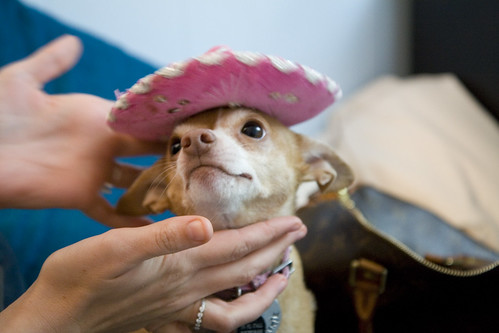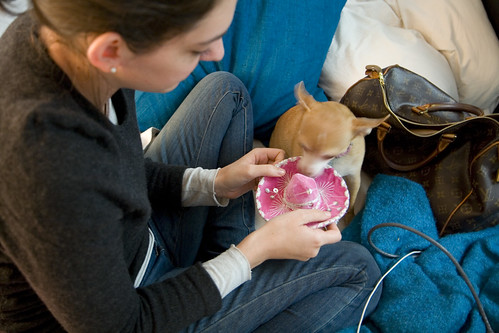
Author: MASadmin
365 #174 : Twinkie Day
365 #173 : CELIA FROM ANTM in Union Square Station
365 #172 : Birthday Present
I really don’t mind talking about my wedding planning so far
Is that weird?
Yesterday, I called/met up with several friends I hadn’t seen in awhile and they all asked me (and my fiancee) how our wedding planning was going. And, to be perfectly honest, I probably could talk about it all day long. In fact, I almost did. I’m not necessarily one of those guys who will get obsessive about HIS DAY and talk about all the planning their doing but I don’t might chatting it up when asked. And people like to ask.
But since my fiancee and I are at the lull point in our wedding process, I sometimes feel bad that I don’t have more to talk about. We’ve nailed the venue, the dress, the wedding bands, the reception hall. We’ve got the photographer. We know how our ceremony is going to work, how the place will look, and how we want the reception done. Our registry is mostly complete. Our guest list is pretty solid. The only thing left is the nitty gritty details and to actually do any DIY stuff for our candy buffet, reception decorations, and the like. Oh. And our counseling that we’re required to attend through our church (which we probably should start rather soon since our current pastor – who I consider a friend – is leaving in a few months).
But probably the big thing that makes wedding planning rather easy right now is that both my fiancee and I don’t have any family pressures. My parents are laid back and just want to know when the date is, how the planning is going, and they’ll show up with bells on. My fiancee’s family is the same. Her family is excited about coming to New York, visiting the city, seeing us, and watching my fiancee and I get married. We have no stress over who we should invite. We have no stress over how the wedding should look or be done. No one is trying to reign in how our big day should function. And that’s 80% of all wedding drama that is reported out there. If your family is laid back, wedding planning is sort of a joy.
Though I do realize that not all families are like ours. Some families take weddings very seriously and believe in being heavily involved. These weddings, in my opinion, tend to be weddings where the “joining of families” can be a big deal. They’re also weddings where the wedding drama isn’t just restricted to just weddings – everyone has been pretty annoying/dramarific in every aspect of each other’s lives since day one. However, because it’s MY BIG DAY, brides to be and grooms to be seem to forget all the past problems and believe that their families are trying to ruin their big day. That’s not true – they’ve been involved in your drama since day one. Some brides to be should build that into their own planning/wedding expectations but most don’t. It’s like how many brides-to-be aren’t happy with their engagement rings but they refuse to tell their fiance’s what rings they want. They want to be surprised, they want the ring to be perfect, and they have a vision in their head that they want matched. They’ll put up with less, of course, but that doesn’t mean they’re happy about it. I find that to be a kinda lame way to live.
So the next thing on our wedding list is my fiancee’s shoes. She has an idea of what she wants and she notices that not many stores carry what she would like. Remember how I bitched about sleeveless wedding dresses? Same thing is going on with open-toe shoes. I understand that the world revolves around trends but you think, with 300 million people in the US, other options would exist. Ah well.
365 #171: Thank You heart and keys
Quick Hits for your May Day 2009
TMZ loves Weddings

Or maybe they’re just running out of ways to make money on celebrity gossip since Britney no longer shaves her head every day. TMZ wants wacky wedding reception photos. They’re looking for marital mayhem. That sounds like a good name for a husband and wife wrestling tag team. If I get laid off, this might be a new career goal I need to follow.
Salma Hayek’s wedding dress was kinda expensive
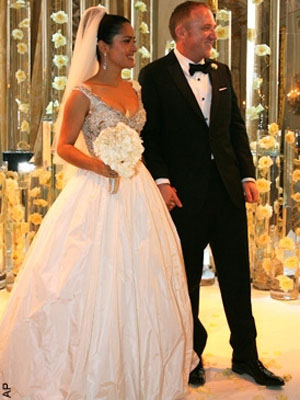
It cost at least $500,000 dollars. I don’t think the girls on the knot would appreciate Salma having two weddings (even a party afterwards still counts as a wedding to some people) but they probably would approve of her dress. And her body. And the fact that she’s worth a lot of money and is marrying a billionaire. But her 2nd wedding? Totally tacky even if it was in Venice.
Free Save the Date Vintage Postcards
Just because I’m not doing STD’s doesn’t mean I won’t link to them.
Engagement 101
Engagement 101 is a magazine for the pre-engaged couples. Well, that’s what it claims. What it really is, is a magazine for women who like to hang out on “Waiting to be engaged” message boards and spent their days “hoping” that today is the day their boyfriends propose. And that’s kinda the whole problem with it. If the guy is suppose to propose, a magazine directed towards women about the pre-engagement process won’t fly (because isn’t pre-engagement already filled with magazines such as Cosmo, Glamour, etc?). However, if the magazine was able to propel these women who want to engaged to get off their butts and actually propose to their boyfriends instead, then maybe I could see it being a valuable resource. But can you really reprint the same article every month that just says “PROPOSE ALREADY. HE CAN’T READ YOUR MIND. IF YOU WANT IT, ASK.”?
365 #170: FDNY
Christian Siriano plays make believe
What if Christian Siriano designed several random celebrity wedding dresses? I bet that’s a question everyone asks (okay, to be honest, I never have) so Brides.com got Christian to sketch some designs for some custom wedding dresses.
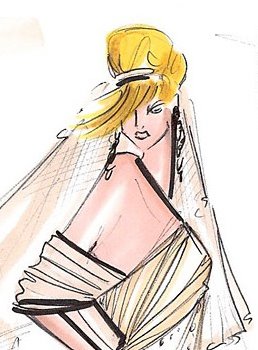
Uma Thurman
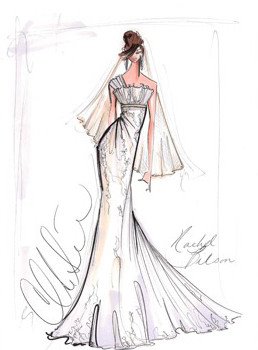
Rachel Bilson

Amy Adams
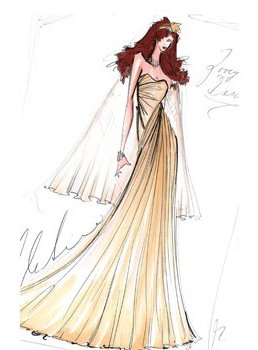
Zooey Deschanel
The dresses are simple, sleeveless (sadly but, these are actresses – they could actually fit into these dresses correctly), and that seems to annoy some people but I think Christian Siriano has the right idea. Why wear a dress that is going to overpower the frame that is wearing it? I think most guys understand that brides are suppose to be the focal point of the big day. We realize that a dress, the ceremony, the makeup, the hair, the photography, and everything else revolves around the bride. So, if that’s part of the wedding ritual, why should the dress be so “ground breaking” as to be the star of the show? It should enhance the bride and not be a distraction from it. There’s a reason why models are suppose to be thin and walk a certain way on the runway. You’re suppose to notice the clothes and not the person wearing them. And if the wedding dress becomes to ornate, the bride becomes some nameless individual walking down aisle. Everyone might know her name but there is going to be a look, or a feeling, that something isn’t quite right and guests (and the groom’s) eyes are going to be pulled away from HER and instead directed at the dress that she’s wearing.
For some brides, this might be the only day of their lives where they get to feel like they’re part of a runway show. But they need to pull back and focus on fit and framing and details. Like I tell myself, the small details are what’s going to be noticed in my tux and suit when I go talk to people during the reception. Those details on the bride’s dress should only be noticed when the dress is examined up close later. If a bride doesn’t want that, then their groom should be allowed to wear a see-through bodice with his tux. This is the 21st century after all; fashion cuts both ways.
